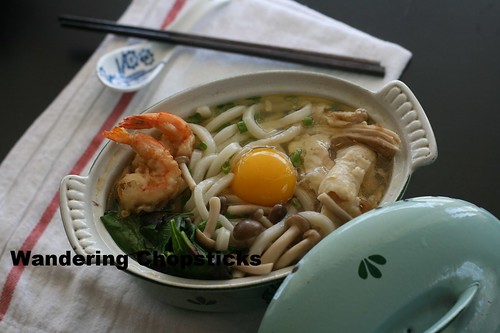
I have a soft spot for Nabeyaki Udon (Japanese Hot Pot Thick Noodle Soup) since it's the first udon I ever tried long ago. Who can resist thick slurpy udon noodles in a warm savory broth with crispy tempura shrimp?
I picked up this 1-quart Dutch metal pot at the thrift store several years ago and knew it was perfect to keep the nabeyaki udon hot. After all nabe means metal pot.
The versions I've eaten frequently featured chicken, mushrooms, spinach, an egg, and tempura shrimp. The only item missing from my version is the sliced Japanese fish cakes.
While it looks like there are a lot of ingredients, this really isn't a difficult recipe at all. I crave a piping hot bowl of nabeyaki udon during the winter, but it can be enjoyed at any time of the year.
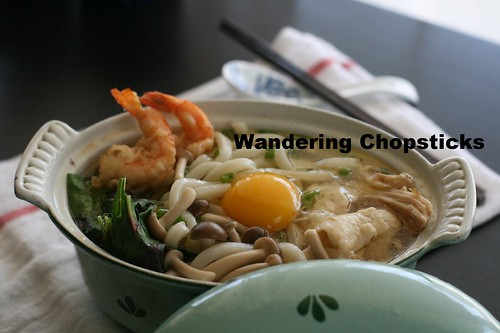
Nabeyaki Udon (Japanese Hot Pot Thick Noodle Soup in a Metal Pot)
For 2 servings, which can easily be doubled, you'll need:
For the stock:
2 quarts water
1 chicken drumstick and thigh or breast
1 3-inch by 3-inch piece of Dashi Kombu (Japanese Kelp)
1 tblsp bonito flakes or 1 tsp Hon-dashi granules
1 tblsp soy sauce
Salt, to taste
For the hot pot:
Spinach
Mushrooms
Fish cakes
Scallions, thinly sliced
Udon noodles
For the tempura:
Shrimp, peeled and deveined
1 cup ice cold water
1 cup flour
1 egg
Oil for frying
Start the stock as it'll take a while before it's ready. If you want to make 4 servings, simply double the ingredients for the stock. In a 5-quart pot, add about 2 quarts of water, 1 chicken drumstick and thigh, a 3-inch by 3-inch piece of Japanese dried kelp, 1 tblsp shaved bonito flakes, and 1 tblsp soy sauce. Simmer on medium-low for at least half an hour to 1 hour.
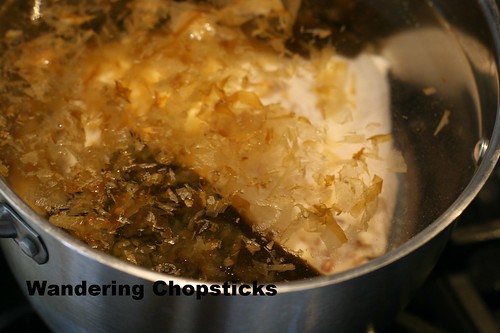
Meanwhile, prep the vegetables by plucking the spinach, slicing the mushrooms, and chopping the scallions. Set aside.
Peel and devein the shrimp. Set aside.
After about half an hour, remove the chicken so it doesn't overcook. Strain the broth and skim the fat and impurities. Taste and add salt if necessary. Leave the pot of stock simmering while you prepare the rest of the ingredients.
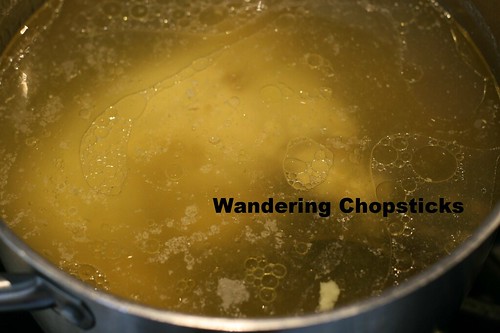
Set a pot of water to boil the udon noodles. Instead of draining the noodles into a colander, I use a pasta spoon and then toss the spinach leaves into the hot water to quickly blanch. Saves a step of setting another pot to boil for the spinach. Make sure you do this after you've removed the noodles or they'll turn green. :P
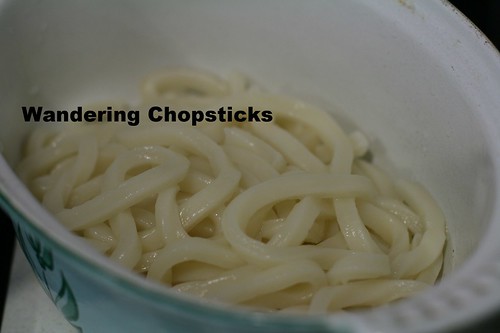
Shred some of the chicken, chop some mushrooms, and drain the spinach. I'm using Chinese red spinach/amaranth leaves, but any kind of soft greens will do.
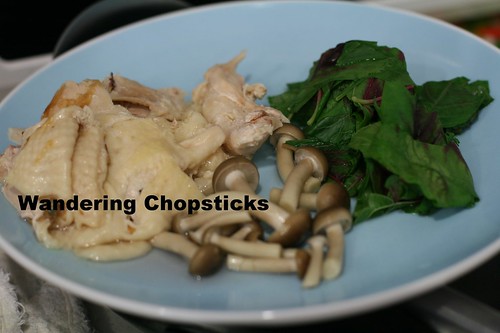
Peel and devein as many shrimp as you'd like.
I made a very small batch of tempura just to fry a few shrimp for this recipe. If you're cooking for more than two, then do the full recipe of 1 cup ice cold water, 1 cup flour, and 1 egg. Otherwise, for just a few shrimp, I just do a quick tempura batter of 1/4 cup ice cold water, 1/4 cup flour, and omit the egg.
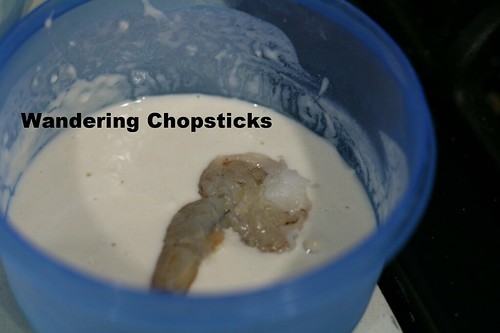
Dredge the shrimp in the batter and fry until crispy. Drain and set aside.
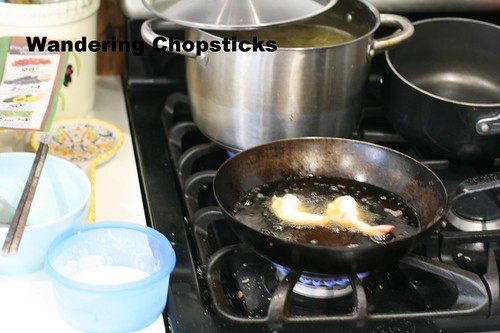
Time to assemble the nabeyaki udon. If you don't have a metal pot, any bowl will do. Layer the noodles on the bottom, top with chicken, mushrooms, spinach, and scallions. Add Japanese fish cake slices if you have any.
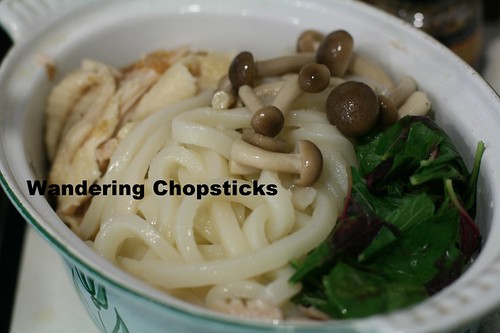
Ladle in the simmering broth. Add an egg and the tempura shrimp.
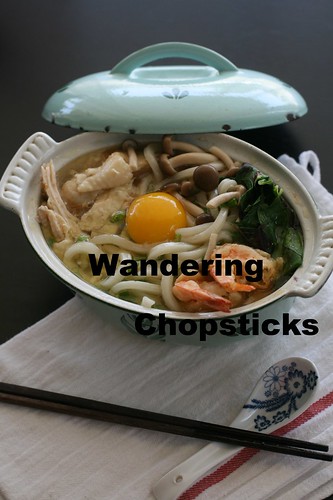
Slurpy delicious nabeyaki udon.
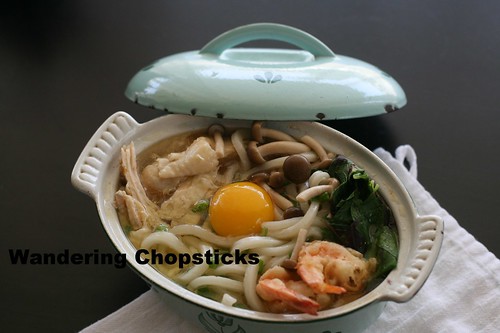
I couldn't resist taking so many photos.
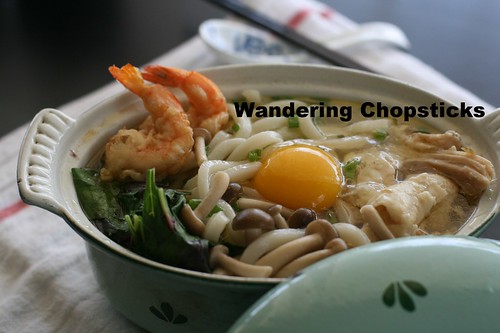
I mean, just look at the gorgeous bowl of nabeyaki udon that I made!
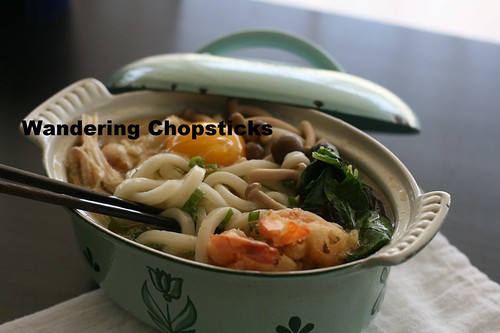
Which I finished cooking just in time to capture the best light.
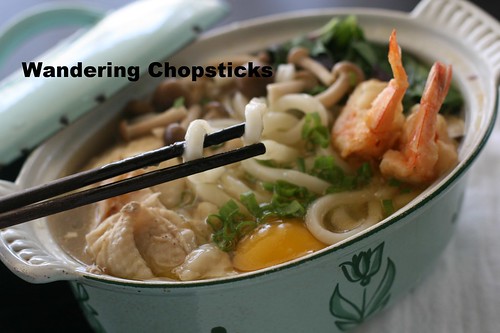
Time to mix up the egg so it cooks in the hot broth and dig in.
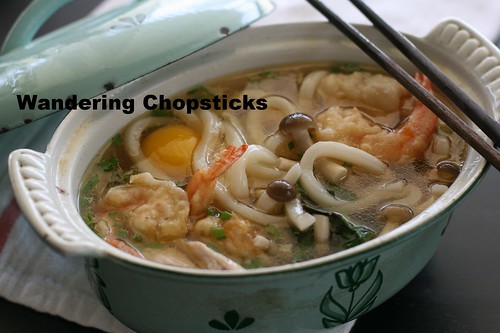
Enjoy!
Other udon recipes:
Yaki Udon (Japanese Stir-Fried Udon Noodles)
*****
1 year ago today,
2 years ago today,
3 years ago today,
4 years ago today, Ha & VL - Portland - Oregon.
5 years ago today, one of my most popular recipes, Bun Bo Hue (Vietnamese Hue-Style Beef Noodle Soup).
6 years ago today, The Edison - Los Angeles (Downtown).

This really looks tasty. I can guarantee that it won't be long before I make this!
ReplyDeleteOh. My. Gosh.
ReplyDeleteI have to double check but I think I have that SAME casserole dish! (I know the tops and the handles are the same, just have to check the side decal and it's in a storage shelf up high.)
It came from my mom's best friend - it was her mother-in-laws casserole dish. So I think we are talking 1930's or 1040's!
Sis,
ReplyDeleteIt's perfect for when the weather gets cooler.
Oddlyme,
1930s! I love vintage kitchenware. So much cuter and sturdier than the stuff they make nowadays.